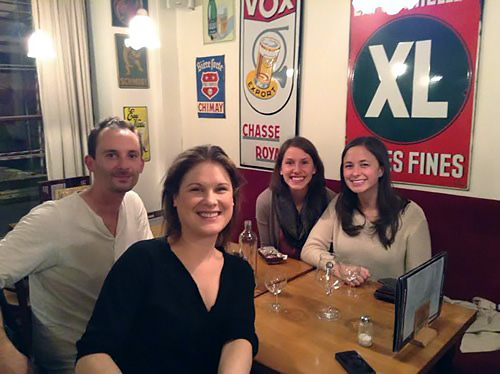10 Tips for Students on Budget Travel and Living in Europe
Article and photos by Sarah Stites

|
|
Grey Abbey in Northern Ireland.
|
Before Christmas of 2013, I had no interest in going abroad. I was quite the homebody, daunted by the prospect of traveling overseas to attend university in a foreign culture. That didn't sound fun — it sounded frightening.
Additionally, I planned to earn my business degree over three years from Grove City College to save money. Going abroad would cost me an arm and a leg. Or so I thought.
However, after an email from my college's international department and a chat with a friend, I was convinced. They told me about a tuition-free opportunity to study abroad for a year in Derry, Northern Ireland. Even better than that, my college would put the scholarship money I had earned into my checking account for my living expenses.
Honestly, my motivation to apply for the program was primarily financial. I knew I'd never again have the opportunity to go abroad at such a low cost. Although I was anxious about it — especially the fact that after paying my way, the program didn't help me with many details — I understood that experiencing life in another country could only change me for the better. I knew I'd gain skills to apply in my career and come back with a broader view of the world and its people.
Looking back, I'm thankful for the boldness that led me to take that step. My year in Europe was the crowning adventure of my first 20 years. I traveled to 15 countries across the continent, from Sweden to Slovakia, often staying with locals.
The experience completely exceeded my expectations; I anticipated feeling overwhelmed and lonely. However, in reality, I gained confidence from organizing the details of my life — from cooking to traveling to planning fun outings and taking the initiative in relationship-building. I made contacts from many different countries and cultural backgrounds, whom I consider some of my dearest friends today.
Although I could talk endlessly about what I learned, focusing on some recommendations about managing finances abroad would be most helpful. I recognize that receiving a full-tuition scholarship made my situation unique. Also, some of my tips are more specific to Europe. However, I hope to tell you there are many ways to cut your traveling expenses while maximizing your fun. Here are the top 10 that I'd advise:
-
Check out available scholarships
and exchange programs. If you're on a budget, it's best to be flexible about the location of your study abroad experience. Check if your college partners with institutions that provide special low-cost programs. Exchange programs can also be a cheaper option. Additionally, do an in-depth search for scholarships. So much money is available to help students who are determined to study abroad! Here are a few sites to get you started: International
Studies Abroad, and the IIE Scholarships and Study Abroad Programs.
-
Get the right credit card. Several credit cards are offering significant benefits to travelers. Look for one that doesn't charge a foreign transaction fee. This way, if you take out money at the ATM, you won't have to pay an extra sum for the conversion. Also, consider signing up for a credit card with a promotional opening offer. Often, in return for spending a certain amount of money within the first months of use, these cards will give you membership rewards redeemable for cash, airfare mileage, or hotel stays. Use comparecards.com to find the card that's best for your particular situation.
-
Stay with a host family or rent a room from locals. Doing this will not only cut down on your living expenses, it will create a richer and more authentic experience for you than living alone. The last thing you want to do is live in a dorm with people from your country. You could do that at home. If you need help finding a website to connect you with hosts, consider emailing religious or intercultural organizations in the area where you'll be living. I found my family through contacting a church!
-
Make local friends. Connecting with a local church enabled me to make wonderful friends who invited me to their homes and on adventures. I heard different perspectives on Derry's history, experienced the Northern Irish's warm hospitality, and laughed over warm, home-cooked meals. I had the privilege of accompanying friends on trips to parks, mountains, and other countries. Some of the most exciting places were often inaccessible or expensive to reach by bus, so having friends with cars was invaluable.

|
|
The view from Muckish Mountain: My Northern Irish friends from church invited me there on a hiking trip. Photo by Sarah Stites.
|
-
Try AirBnB or VRBO. Staying
at hostels (see TransitionsAbroad.com's list of hostels) can be great and the sites to book hostels are now excellent. Hostels are great for meeting fellow travelers and making international connections. Try Airbnb or VRBO, which enable you to rent a private room or a whole apartment. Home rentals allow for more flexibility in buying and potentially cooking your meals at low cost, for example, sharing private space with friends (s), and independence. (Editor's Note: Both options could be better for meeting locals directly, unless you meet locals who run or work at a hostel, or get to know a friendly local owner of a rental — if the rental is not run by an agency.)

|
|
Dinner at an authentic Belgian café with my Couchsurfing host in Brussels. Photo by Sarah Stites.
|
-
Set up classes for long weekends. Consider scheduling your classes to give you more extended periods of time to travel. Personally, I was able to work my schedule at Ulster University to provide me with 4-day weekends. This was perfect for planning trips.
-
Take advantage of Skyscanner and omio. Skyscanner is a website that aggregates flights by price. Input your home airport and set the destination to "everywhere," you'll get a list of the cheapest flights over a specific time range. Being in Europe, I could take advantage of many low-cost flights through the airline RyanAir. However, flexibility is definitely the key to using Skyscanner. I didn't mind where I went. I wanted to see as much of Europe as I could. So, when it was cheap to fly to Brussels, I planned a trip to Belgium. If flights to Oslo were the right price in December, then that was when I went to Norway. Omio is similar to Skyscanner, but also aggregates prices for bus and train travel.
-
Check out travel apps. There are so many great apps right at your fingertips! Before you pay to use a restroom abroad, open "Flush" to find the nearest free bathroom. Need to connect to the internet? Check "Free WiFi Finder" to locate a free internet hotspot. Without an internet connection, I quickly navigated London using "CityMaps2Go."
-
Buy reduced, generic, and bulk groceries. Also go to local markets. It is important to enjoy visiting local restaurants with friends, but don't make it routine if your budget is tight. Some host families might be kind enough to cook for you, but if you're not in that situation, consider cooking for yourself rather than eating out. I generally made my own meals, often purchasing produce from the reduced-price section of a supermarket. I would buy bulk items like lentils or store-brand oatmeal instead of brand-name. Watching for sales and deals on food can save you money to put toward experiences you'll remember for a lifetime.
(Editor's Note: for produce, often local markets in Europe can't be beat for price, freshness, and taste.)
-
Consider applying for a virtual internship. Before I left the States, I applied for several virtual internships using online databases. Thankfully, I secured a paid position as a social media intern and worked 1-5 hours a week. The work was flexible and only required an internet connection. This gave me work experience and supplied extra pocket money for my travels.
Just remember: living cheaply often equates to living more authentically. Going local — local friends, local food, local accommodation — are ways to get the most out of your experience and the least out of your wallet.
Before I went abroad, I never expected that traveling would significantly affect my life. That all changed after my year in Northern Ireland. As I greatly desire to return to Europe, I have just submitted my application for a Fulbright grant to study consumer behavior at Madrid's Instituto de Empresa. I may apply for the Foreign Service someday. My biggest achievable goal is to become fluent in Spanish. But wherever the future takes me, I know it will be abroad.
The last tip I have to share is keeping a detailed journal or blog (I used the WordPress platform). Not only does it enable you to keep loved ones updated about your life, but it also helps you process and memorialize your experiences. Looking back at my posts several months after my return home has been gratifying. I am thankful that while the memories were still fresh, I was able to capture emotions and detailed anecdotes to share with my children in years to come. It requires dedication, but you'll be so thankful you put in the time. Happy traveling!
Sarah Stites is a marketing management major from Reston, VA. Her hobbies include running cross country, hiking, reading classic literature, and cooking ethnic dishes. She aspires to an international career after her year abroad in Northern Ireland.
|
